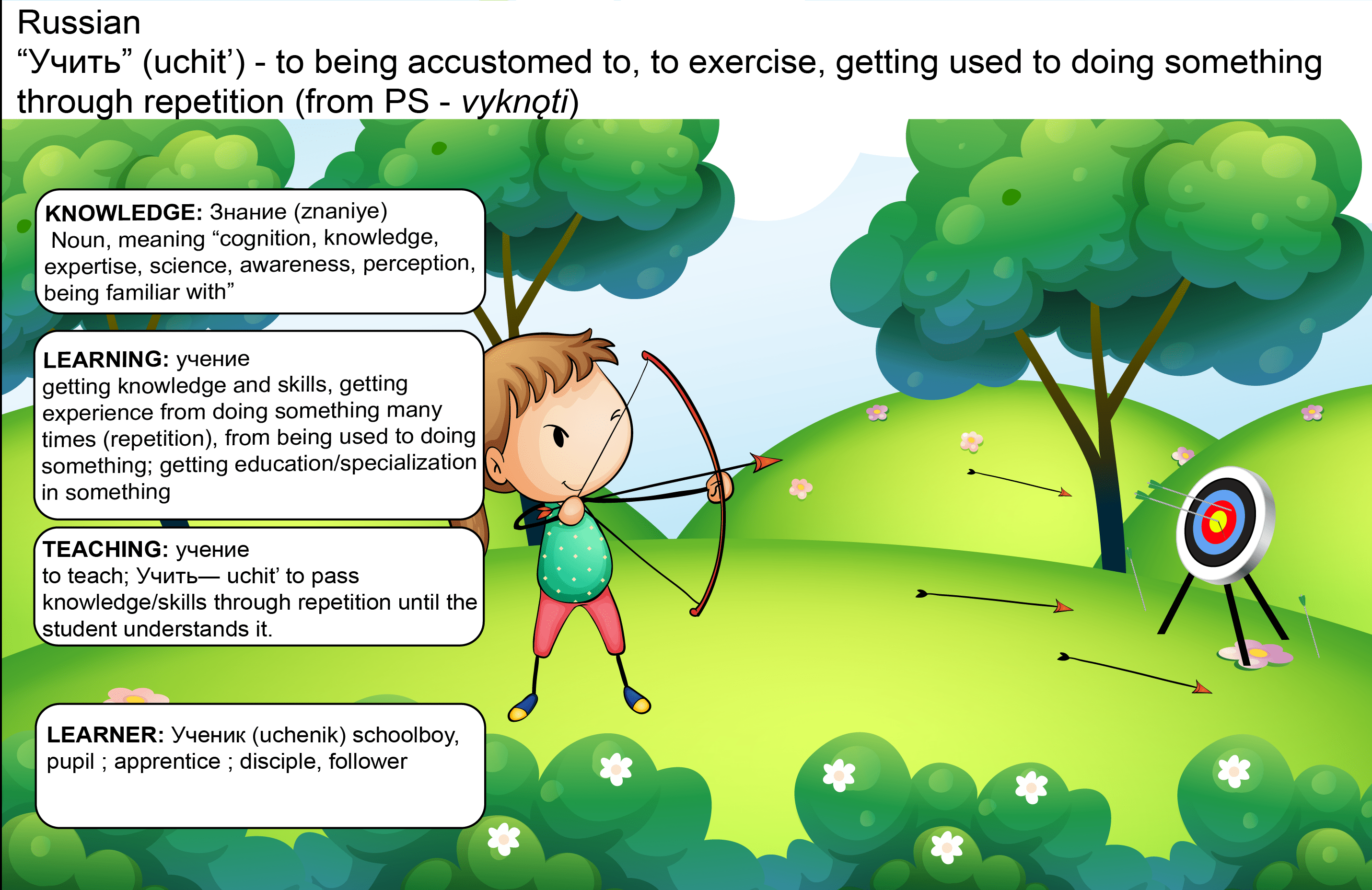Root Metaphor
“Учи́ть” (uchit’) - to being accustomed to, to exercise, getting used to doing something through repetitionIllustrative Example of Root Metaphor

Etymology
“Учи́ть” (uchit’) comes from the Slavic root укъ «учение» the same root as in Lithuanian jaukìnti «приучать» (to teach somebody to be used to doing something), Armenian usanim «учусь, приучаюсь» (learning to be used to doing something). This word is thought to relate to the skill, the habit of getting used to something, Proto-Slavic root vyknǫti, which means “getting accustomed to,” also connected with the skill you acquire by doing something repeatedly. Historically, the Russian words for “learning and a learner” have the same root as the Russian words “habit, skill and to get accustomed to. This word goes back to the same root as the Gothic word 𐌱𐌹𐌿𐌷𐍄𐍃 (biūhts), meaning “habitual”. Old East Slavic — учити, укъ (учение): uchiti. uchit’+sya учиться, to learn— reflexive and transitive. It has the meaning of getting skills, knowledge, experience, and habits by doing something many times, to make something a part of who you are. It has habitual nature. Without –sya it turns into “to teach somebody,” it becomes transitive. In Old Prussian Language (Western Baltic language belonging to the Balto-Slavic branch of the Indo-European languages, once spoken by the Old Prussians)— iaukint (упражнять, упражняться, it means “to exercise,” doing something repeatedly, until it becomes a habit). It possibly goes back to the ancient Indian word úсуаt, which means “find satisfaction.” Several language researchers draw a parallel with Old Irish do-uccim (meaning “I understand, I know”).Common metaphoric phrases
Common phrases about learning Повторение - мать учения. Repetition is the mother of learning.- Hа ошибках учатся. You learn from making mistakes. (It implies repetition.)
- Учение - путь к умению. Learning is a way to becoming skilled at doing something. (You become skilled by doing something repeatedly.)
- Bек живи – век учись. Live a century, learn a century. This phrase implies that you are constantly learning something new, and you never stop learning.
- Учению - время, потехе - час.There is time for learning and time for having fun.
- Bек живи́, век учи́сь, а дурако́м помрёшь (sarcastic) Vek zhiví, vek uchísʹ, a durakóm pomryosh. The more you know, the more you forget (literally, “live a century, learn a century, and you’ll die a fool”)
- Учи́ться никогда́ не по́здно (proverb) ― uchítʹsja nikogdá ne pózdno ― it is never too late to learn
- Учи́сь уму́ на чужо́й глу́пости; учи́сь му́дрости на чужи́х оши́бках (proverbs) ― uchísʹ umú na chuzhoi glúposti; uchísʹ múdrosti na chuzhih oshíbkah ― Learn wisdom from the mistakes of others.
- Учи́ться на со́бственных оши́бках (saying) ― uchítʹsja na sóbstvennih oshíbkah― to learn from one’s mistakes
- Учение и труд всё перетрут. Ucheniye i troot, vsyo peretroot. Learning and labour will help you overcome the difficulties.
- Учить―ум точить. Uchit’ oom tochit’. When you learn, your mind becomes sharp.
- Учение свет, а неучение тьма. (proverb) Ucheniye svet, ar nye ucheniye t’ma. Learning is like light and not learning is like being in the dark.
- Учи других, и сам научишься. Uchi drugih, i sam nauchish’sya. You can learn through teaching others.
- Каждый учитель учит по-своему. Каzhdiy uchitel’ uchit po-svoyemu. Every teacher teaches uniquely.
- Яйца курицу не учат. Yaitsa kuritsu ne uchat. Literally: “Eggs cannot teach a hen.” The meaning is: “Kids cannot teach adults.”
- преподава́тель у́чит студе́нта ― prepodavátelʹ úchit studénta ― the teacher teaches the student
- способный ученик: sposobniy uchenik, masculine a quick learner
- продвинутый ученик: prodvinutiy uchenik , masculine an advanced learner
- одаренный ученик: odarenniy uchenik, a gifted learner
- малоспособныйученик: malosposobnyy uchenik a slow learner
- Proverb: Каков учитель, таков и ученик. You can tell the student by his teacher.
- Ученикученикурознь. Uchenik ucheniku rozn’. There are all kinds of students. No two students are alike.
- Знание ― это сила! Znaniye eto sila! Knowledge is strength.
- Знание ―это дело наживное. Znaniye delo nazhivnoye. Knowledge can be acquired.
- Не стыдно ― не знать, стыдно ―не учиться. It’s not shameful not to know something, but it is shameful not wanting to learn about it.
- Знаешь ―говори, не знаешь ― слушай. Znayesh’ ― govori, ne znaesch’ ― slushai. If you know something, then speak up; if you don’t know it, then listen.
Commentary
If we add a prefix -при to uchit, it turns to приучи́ться (priučítʹsja), which means “to get used to, to be accustomed to.” For example, I am used to saying, “thank you.” Я приучился говорить “спасибо.” Ya priučílsja govorit’ spasibo. If we add a prefix – за, then we will get заучивать (zauchivat’), it means to learn something by heart through repetition, to memorize. LEARNER: Ученик (uchenik) Masculine Noun: 1. schoolboy, pupil 2. apprentice, learner 3. disciple, follower Synonyms: шко́льник (shkólʹnik) comes from a noun школа (shkola), from Latin “schola” /school, уча́щийся (uchaschiysya, a person who is studying) учени́ца (uchenitsa), feminine, a learner TEACHING/учение: it is the same word in Russian as “learning”, but it becomes transitive when it changes the meaning to teaching It is fascinating that the words "to teach" and "to learn" are the same in Russian, it shows in itself that this word requires multiple actors. Maybe say more…Implicit Spatial Associations
The learner is an active agent.Please cite this article as:
Francis, K., Davis, B. Sabbaghan, S. & Amy, O. (2023). “Uchit" (Russian) in Metaphors of Learning in Different Languages. https://doi.org/10.11575/8B7N-V637. https://learningmetaphors.com
⇦ Back to Map
⇦ Back to List
